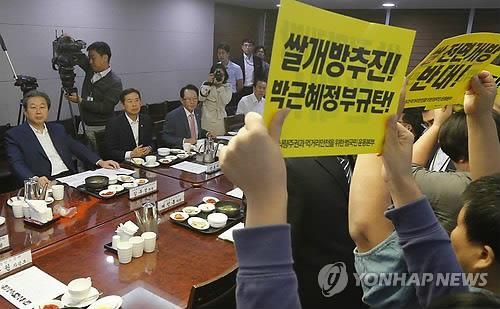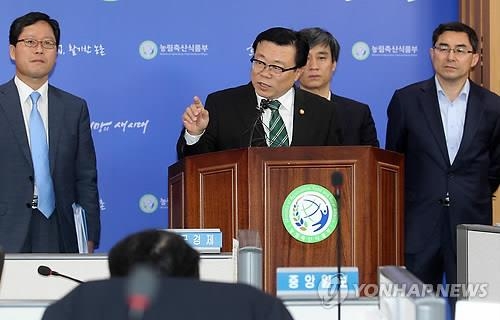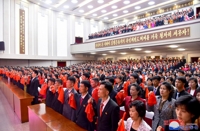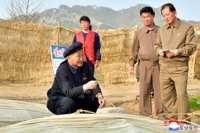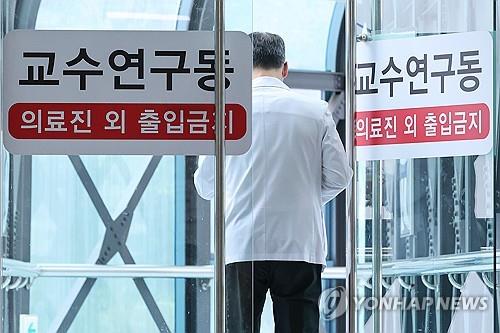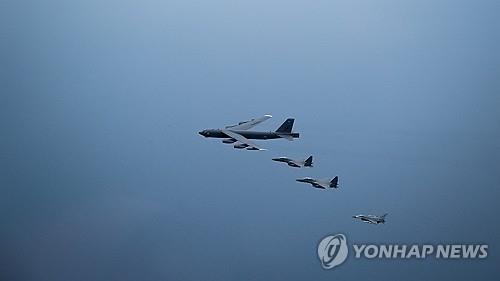(4th LD) S. Korean gov't sets import rice tariff rate at 513 pct
(ATTN: ADDS photos; UPDATES with additional information in paras 15-16)
By Byun Duk-kun
SEJONG, Sept. 18 (Yonhap) -- The South Korean government said Thursday it will set the country's tariff rate on rice imports at 513 percent, which it said will be more than enough to protect the country's rice industry by making imports more expensive than locally produced grain.
The move comes as the country is set to liberalize its rice market from next year.
The proposed tariff rate will be notified to the World Trade Organization (WTO), the Ministry of Agriculture, Food and Rural Affairs said.
The rate, once confirmed by the WTO, will go into effect on Jan. 1, although the WTO process could take months to verify whether South Korea's proposed rate is appropriate, according to the ministry.
"The tariff rate must undergo a verification process by WTO member countries, and thus the government will thoroughly prepare for the WTO verification based on its logic and data," it said.
Still, the move to liberalize the country's rice market through tariffication faces strong opposition from farmers who claim that the proposed tariff rate will not make imports expensive enough.
A government-ruling party policy coordination meeting to discuss the rice import tariff rate earlier Thursday was briefly suspended as angry farmers tried to occupy the meeting venue, throwing eggs and red pepper powder.
Agriculture Minister Lee Dong-phil said the country neither could afford to further postpone market opening nor has any reason to do so, especially while the country's rice consumption continues to drop.
"Over the past 20 years, our rice industry has been improving its competitiveness in terms of productivity and quality through continuous modernization and mechanization of its production process," he told a press conference.
South Korea has been allowed to delay its rice market opening under a 1993 agreement with the WTO in exchange for gradually increasing its mandatory import quota, which reached 408,700 tons this year.
Lee said the country will have to continue importing the mandatory quota even after next year's market opening, at a preferential 5 percent tariff rate.
The 513 percent tariff on non-mandatory imports will effectively prevent an overflow of cheap foreign rice into the local market, the minister said, calling it "the highest possible level under WTO convention in agriculture."
Japan opened its rice market through tariffication in 1999, but it only imported an average 350 tons of rice under high tariffs from 2000 to 2013, according to the ministry.
Taiwan, which also liberalized its rice market in 2003, imports only about 500 tons of rice per year, in addition to 144,720 tons in mandatory import quota.
Deputy Agriculture Minister Lee Joon-won explained that Japan imposes a specific tax of 139 yen ($0.13) per one kilogram of rice imports, which, at the time of its market liberalization in 1999 was equivalent to an ad valorem duty of 1,066 percent, nearly double the 513 percent that South Korea is proposing.
An ad valorem duty is a tax based on the value of an article and therefore varies due to changes in the price.
In addition to the high tariff rate, the government announced a set of measures aimed at protecting the country's rice market, including banning retailers from mixing domestic and imported rice.
All rice imports will be subject to a review to verify their reported price, a move aimed at exposing false prices that would lower their market price, the ministry said.
The government also reaffirmed its pledge to exclude rice from market liberalization under any future trade agreements.
"As it is also important to maintain the country's rice import tariff rate, the government plans to continue excluding rice from the list of products to be liberalized under any free trade agreements the country seeks to take part in in the future," it said.
bdk@yna.co.kr
(END)
-
 Ateez member Yunho throws first pitch at MLB match between Dodgers, Mets
Ateez member Yunho throws first pitch at MLB match between Dodgers, Mets -
 Gov't likely to accept university chiefs' request to lower med school enrollment quota
Gov't likely to accept university chiefs' request to lower med school enrollment quota -
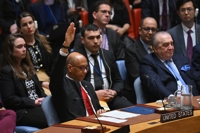 S. Korea supports resolution backing U.N. membership of Palestine
S. Korea supports resolution backing U.N. membership of Palestine -
 Chinese man behind drug scam targeting teens nabbed in Cambodia
Chinese man behind drug scam targeting teens nabbed in Cambodia -
 S. Korea, U.S. to hold 1st round of defense cost sharing talks this week
S. Korea, U.S. to hold 1st round of defense cost sharing talks this week
-
 Gov't likely to accept university chiefs' request to lower med school enrollment quota
Gov't likely to accept university chiefs' request to lower med school enrollment quota -
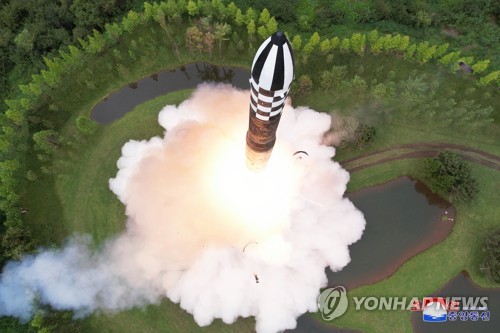 Experts see possibility of N.K. conducting nuclear test before U.S. presidential vote
Experts see possibility of N.K. conducting nuclear test before U.S. presidential vote -
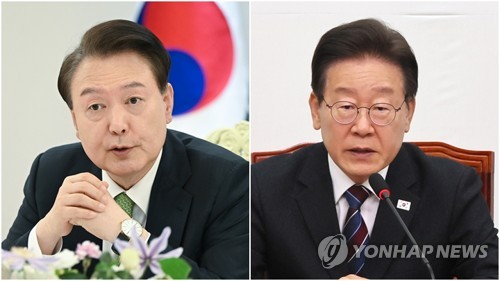 Details of meeting between Yoon, opposition leader undecided: presidential office
Details of meeting between Yoon, opposition leader undecided: presidential office -
 Looming weekly closure of major hospitals feared to worsen medical service crisis
Looming weekly closure of major hospitals feared to worsen medical service crisis -
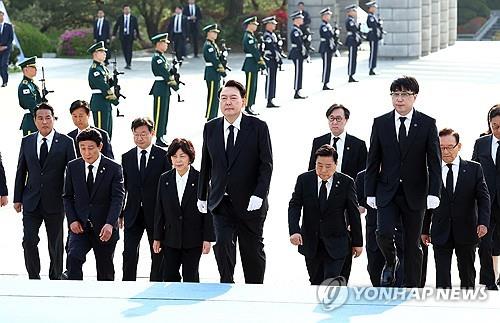 Yoon's approval rating sinks to lowest point since taking office
Yoon's approval rating sinks to lowest point since taking office
-
 (LEAD) Hybe to file complaint against sublabel executives over internal conflict
(LEAD) Hybe to file complaint against sublabel executives over internal conflict -
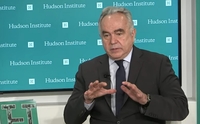 U.S. will take steps for three-way engagement on nuclear deterrence with S. Korea, Japan: Campbell
U.S. will take steps for three-way engagement on nuclear deterrence with S. Korea, Japan: Campbell -
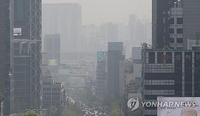 S. Korea reports highest suicide rate, ultra fine dust level among OECD nations: data
S. Korea reports highest suicide rate, ultra fine dust level among OECD nations: data -
 U.S. sent ATACMS missiles to Ukraine following Russia's use of N.K. missiles: White House
U.S. sent ATACMS missiles to Ukraine following Russia's use of N.K. missiles: White House -
 (3rd LD) Hybe to file complaint against sublabel executives over internal conflict
(3rd LD) Hybe to file complaint against sublabel executives over internal conflict
